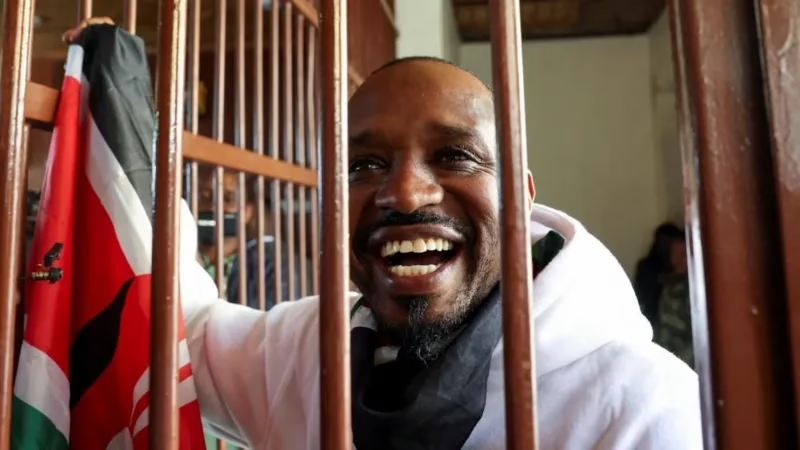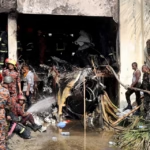Boniface Mwangi has been released on bail after denying the charge of illegal possession of ammunition
Nairobi, July 21 — Kenyan human rights activist Boniface Mwangi, who has played a prominent role in anti-government protests, was freed on bail on Monday after being charged with possession of teargas canisters and a single rifle round found in his home. He denied the charges.
Mwangi was not charged with “facilitation of terrorist acts”, as the police had earlier said.
On Sunday, investigators said they had seized phones, a laptop, and notebooks from his Lukenya home on the outskirts of the capital, Nairobi, and hard drives, computers, tear gas canisters and a blank firearm round from his office in the city.
His arrest – and especially the suggestion that he would face terrorism charges – sparked a wave of condemnation, with human rights groups denouncing it as aimed at suppressing opposition voices. The activist denied the accusations against him, saying in a post on X: “I am not a terrorist.”
The alleged offences are linked to anti-government protests on 25 June where, according to the state-funded Kenya National Commission on Human Rights (KNCHR), 19 people died when demonstrators clashed with police. Hundreds were also injured and property and businesses were damaged.
The search warrant police used to raid Mr Mwangi’s home and office accused the activist of paying “goons” to stoke unrest at the protests.
Outside the court on Monday, Mwangi told supporters and journalists: “The president think that the anger against his government is manufactured and people are being paid.”
“People hate [Kenyan President William] Ruto for free.”
Holding a Kenyan flag and wearing a T-shirt bearing the words “I love my country”, Mwangi added that he had never worked with “goons” his “entire life”.
As he entered the courtroom, fellow activists and supporters, who had gathered to show their solidarity and support, sang the national anthem.
Most of those killed on 25 June died from gunshot wounds, with human rights groups blaming police brutality.
However, Interior Minister Kipchumba Murkomen described the demonstrations as “terrorism disguised as dissent” and an “unconstitutional attempt” to change the government. He said that several police station had been attacked, with many officers injured and vehicles set on fire.
At least 38 more people were killed in subsequent protests earlier this month, the KNCHR says.
Since June last year, more than 100 people have been killed in successive waves of anti-government protests, with police accused of using excessive force to quell each one, leading to further demonstrations.
President William Ruto urged the police to shoot violent protesters in the leg, rather than killing them.
On Sunday, a coalition of 37 rights organisations condemned Mwangi’s arrest on “unjustified terrorism allegations”, describing it as the “latest escalation in a systematic crackdown that has seen hundreds of young Kenyans detained on fabricated terrorism charges”.
“What began as targeted persecution of young protesters demanding accountability has metastasized into a full-scale assault on Kenya’s democracy,” they said in a joint statement.
Mr Mwangi has been detained multiple times in the past, and has been at the centre of many protests.
In May, he and a Ugandan activist Agather Atuhaire were detained in Tanzania, where they had travelled to attend the trial of Tanzanian opposition leader Tundu Lissu, who is accused of treason.
Following their release several days later, both said they had been abducted, tortured and sexually assaulted. They have since filed a case at the regional East African Court of Justice over the matter.
Boniface Mwangi is widely regarded as one of Kenya’s most prominent and fearless activists with a significant part of his life defined by his push for social justice.
He has been the face of many protests in the past, some of them dramatic and symbolic. This includes the 2013 demonstration when he brought piglets covered in blood to the gates of parliament in a protest against “greedy MPs” – who were demanding a pay increase.
In 2024, he called on people to bring coffins to the streets in a symbol of the way he said MPs were taxing Kenyans “to death” and to represent people killed by police in protests.
He has been beaten, arrested and detained many times for his bold and provocative actions. He has often spoken about the physical and emotional scars from his years of activism – and yet he has remained undeterred.
A former photojournalist, Mwangi rose to global prominence after he documented the deadly violence that followed the 2007 election, with his powerful images capturing the depth of the crisis in which more than 1,000 people died and 350,000 forced from their homes.
He subsequently won the CNN Africa Photojournalist of the Year Award in 2008.
Mwangi has since said that the journey of documenting these images personally affected him and left him disillusioned. He later moved to activism, and has since won other accolades, including being named among the top 100 most influential Africans by New African magazine in 2020.



